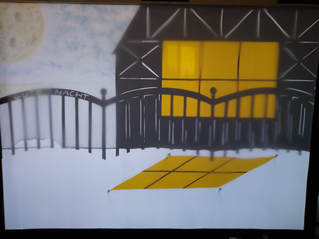 Gute Nacht, opening scene Gute Nacht, opening scene This is really what Winterreise is about. You can say it is about a search for meaning, or an attempt at transmutation (for better or worse), and it is about all these things, but beyond all that it is about living through your pain and experiencing every flavor of it because not to do so would be worse. Sure, our wanderer could have left that house and gone on to another one, found love there; or maybe buried himself in his work, whatever that might be; or even have become an alcoholic or opium addict…but he doesn’t. Many of us have done these kinds of things in times of grief, but the grief always resurfaces, often in awkward ways. Men especially are taught to be stronger than their emotions, that giving into them is weak and to be avoided at all costs. 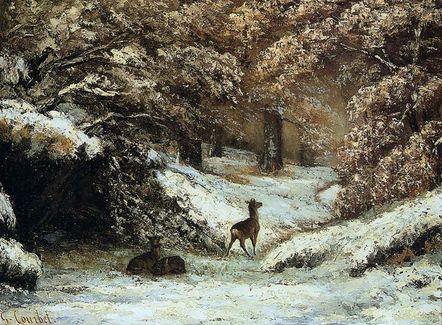 Deer Taking Shelter in Winter - Gustave Courbet Deer Taking Shelter in Winter - Gustave Courbet There is a temptation to view the wanderer in Winterreise as weak because he is always talking about his feelings and his longing for death. It’s easy to see this as wallowing. Honestly, we don’t know how much time has elapsed on his journey between the first song and the last. It’s probably longer than a day, but beyond that is it a week, a month, two months? How long must someone wander through such pain before we call it wallowing? Now that the science of psychology is better understood there is a push for greater acceptance of mental illness and trauma, less judgment on those who won’t just “get over it” whether their trauma be great or light in society’s eyes. We still have a long way to go toward completely rejecting the stigma of “excessive feeling” but we’re on the path, and at least we’ve expanded our understanding of PTSD so it’s not a disorder tied to a specific type of objectively severe trauma but is linked to the way an individual reacts to their own experiences. Most telling is that the wanderer in Winterreise doesn’t even attempt suicide. He is tempted many times, and often disappointed that he won’t just die of natural causes. It is especially interesting that he doesn’t commit suicide when it was such a common Romantic era trope to kill oneself over unrequited love. What does this tell us? For one thing, this wanderer is anything but weak (the concept of death vs gender and what this says about strength vs weakness is explored by Schubert and his friend, Josef Spaun, in two other songs which are clearly related to one another, but I'll save that for another post). Winterreise's wanderer wants to experience the bitterness of his situation to the last drop, and he is not staying alive for hope that his lot will improve. He doesn’t seem to have such hope, but he does seem to have an almost scientific curiosity about what might come next. It would appear that a part of him is an objective observer to his own pain, like when his tears turn to ice in Gefror’ne Tränen and he realizes he didn’t even know he was weeping. In this song and the next one, Erstarrung, he is terrified about what a lack of pain or what getting over his sweetheart would mean: would it mean he never really loved her and he is therefore incapable of feeling true love? Would it mean that without the pain of rejection there would be no other feelings beneath that? These issues come up in many of the Winterreise songs. 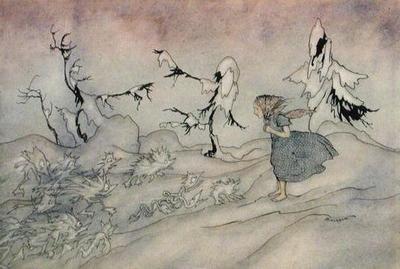 Illustration from The Snow Queen - Arthur Rackham Illustration from The Snow Queen - Arthur Rackham I understand what this is like. There have been very few times in my life when I didn’t have a crush on someone. For those couple of months when I didn’t I felt very strange, almost like a robot (hence the wheels and gears you may see in my interpretation of some of these songs). It was nice in its way, life felt stable, but also passionless. There have also been many times when I’ve been extremely reluctant to even try to get over someone because I was afraid of what that would say about my feelings for them. Once I fall out of love with someone that love never comes back, and the finality of that is scary. I always wonder at all those other people who can meet a former lover or crush later in life and fall in love with them again, it just seems so unreal to me. The fear that falling out of love with someone might mean I never truly loved them to begin with is also worrisome, and of course that also forces me to ask if I’ve ever really been in love or if I am in fact incapable of experiencing love at all. 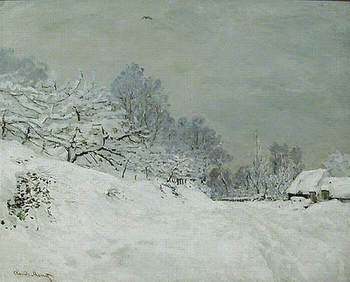 Snow Near Honfleur - Claude Monet Snow Near Honfleur - Claude Monet Last month I sat at the bar where I and my former fiancé would often hang out and realized that I thought I had finished my personal winter’s journey, but I still have so terribly far to go. It’s no longer about trying to get over him, and hasn’t been for a long time, but it’s about finding my path. Where is my path if romantic love is not going to be a part of it? What does that mean for me? I hope you don’t pity me for saying such a thing. It’s just an objective observation. Romantic love is fun, but it doesn’t work for me. In Winterreise we see something similar in the difference between Part One and Part Two. Part One is mostly about processing the pain of the break up. Part Two is mostly about finding a path outside of romance, human companionship even, and wondering what such a life would be like and what it would mean. The wanderer laments much about how he is not like other people, how he can’t share the same dreams, the same paths, and this contributes to his loneliness in the second half. This sheds an interesting light on what his break up actually meant for him. Many of us think of ourselves as “weirdos,” too weird for anyone to possibly love us. For these weirdos break ups are especially painful because we never understand how anyone could have fallen in love with us to begin with. These weirdos come in many forms. Maybe you are an artist, or have a mental illness, or strange habits, or perhaps you are a nerd, or are obsessed with some niche subject that no one ever wants to talk with you about. Honestly, this is most people! This is why you may see this winter’s journey as your own. Weirdos are constantly striving to understand themselves and why they can’t connect with others the way they wish they could. While love is always a miracle, it is a much bigger miracle for a weirdo who has convinced themselves they are unlovable the way they are, and it is a much bigger loss when that love is taken away. Clearly, for some reason the Winterreise wanderer considers himself to be a weirdo. 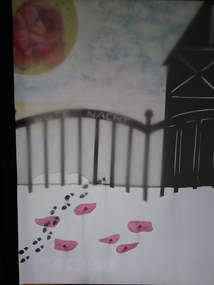 Gute Nacht last verse Gute Nacht last verse I definitely feel like one of these people who is too weird to be loved. I also recognize that much of this weirdness is my own choice. You see, we weirdos are actually extremely romantic people. We may seem cold and aloof regarding potential romantic prospects, but we love very deeply. We just feel like we’re constantly faced with the horrifying reality that in order to make such love work we will have to give up an essential part of ourselves. While the thought of living a life without love is painful, the thought of giving up that part of ourselves for love is even more painful. Ian Bostridge in his book, Schubert’s Winter Journey: Anatomy of an Obsession, makes an interesting assumption about Schubert’s supposed love for the soprano Therese Grob. I agree with his assessment that Schubert definitely wanted to marry her but couldn’t because the marriage law at the time required the man to make a certain amount of money before a marriage license would be granted. Schubert clearly lamented his inability to make enough money to marry her, but what Bostridge questions is how deep was Schubert’s love then to begin with? If he loved Therese truly wouldn’t it have been worth it to him to find a job (any job) that would have paid him enough to marry her? This is a choice I myself have faced, not because of any laws, thankfully, but because my fiancé was concerned that I didn’t make enough money as an artist for us to get married after all, and this is part of the reason we broke up. I could have genuinely tried to find a job that would have made more money, but I chose to focus on my art. That doesn’t mean the break up wasn’t painful, or that I never really loved my fiancé, it just means that I needed my art in my life more. I see that this was the kind of horrible choice Schubert faced in his youth How much did this incident inspire his setting of Winterreise? How much will my similar experience inspire my own interpretation of the piece with shadow puppets (the creation of shadow puppet operas was also, incidentally, my way through the pain of that break up)? Did Schubert experience the same wondering, questioning of priorities in life and love? Personally, I don’t think either Schubert or I regretted the decision to make art the priority over romantic love (Schubert even once referred to music as “the beloved,” which makes me smile), but it does make us “weirdos” in the sense that our priorities are/were just different from what it is we’re “supposed to” want out of life. This could also be what makes the wanderer’s journey through endless winter so complex. Sometimes life is not about choosing what will make us happiest, but about choosing what will hurt the least and give our lives the most meaning. Art is so often about creating meaning, and art is a great substitute for happiness. Art is always a way through the pain, even if we never make it all the way through to springtime.
0 Comments
|
AuthorHi, Juliana Brandon here. This is where I let you peek behind the scenes here at Paper Puppet Opera. See works in progress, rehearsal snippets, and learn more about the history behind each production. Archives
March 2023
Categories |
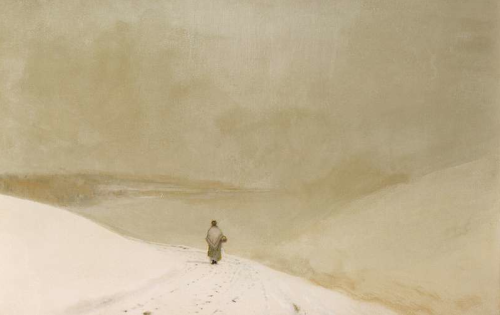
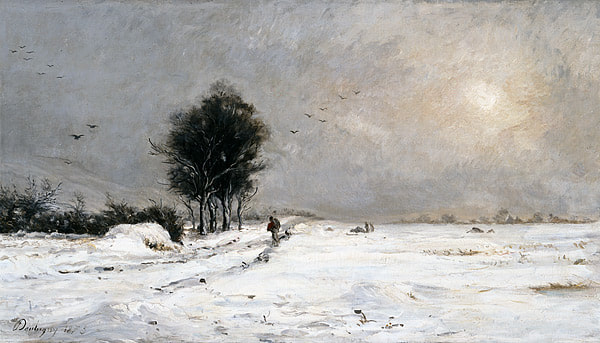
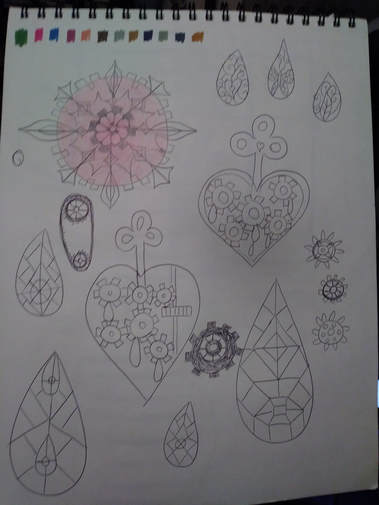
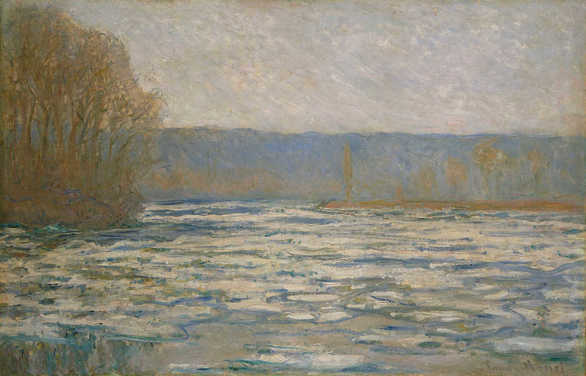
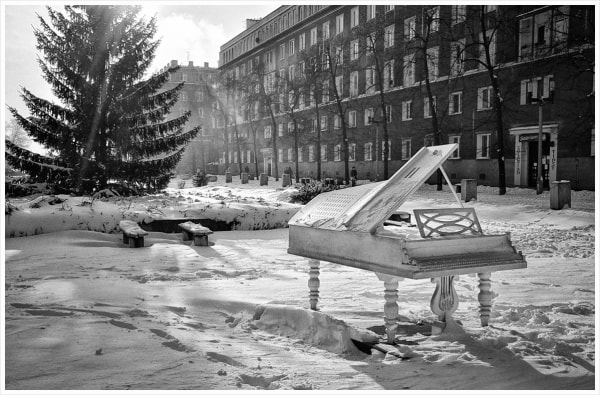
 RSS Feed
RSS Feed